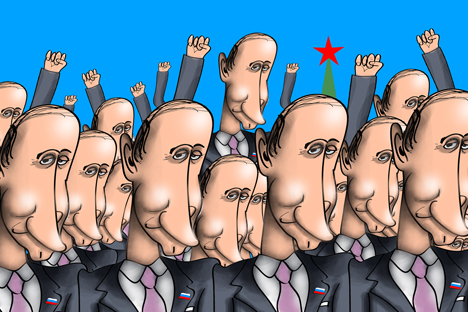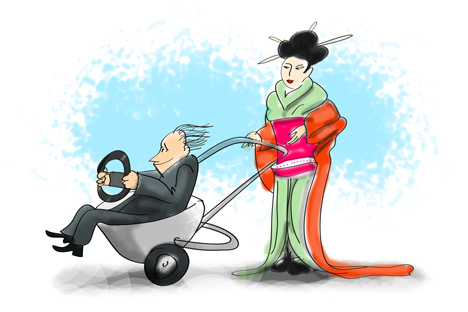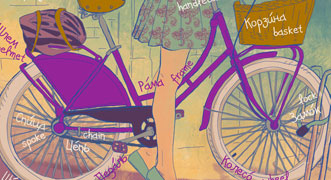White ribboners and tandemocracy: Russia's new political vocabulary

Click to enlarge the cartoon. Drawing by Niyaz Karim
In December 2011, a series of antigovernment protests were held in Moscow, giving rise to a protest movement that has since significantly replenished the Russian political vocabulary.
The opposition movement chose the white ribbon as its symbol. Participants in antigovernment rallies would pin such stripes to their clothes; before long, the term "white ribboners" was coined to refer to opposition supporters.
Several such symbolic protests were held in 2012, including the White Ring event in which people wearing white ribbons stretched in a circle along the Sadovoye Koltso ring-road around the center of Moscow (more than 15 kilometers in length).
The color white was understood to symbolize snow and winter, but also the purity and honesty, which the opposition demanded from the authorities. Another color associated with these protests was orange: not long before the pro-Western Orange Revolution had emerged in Ukraine, so the Russian pro-Western opposition also came to be called the Orangists.
The first of the Moscow protests was staged on centrally located Bolotnaya Square. The term "Bolotnaya" immediately started to be applied generically to the opposition, as in "the Bolotnaya movement". Shortly afterwards, an antonym was born, following a pro-government rally on Moscow's Poklonnaya Gora square, the Bolotnaya vs Poklonnaya semantic opposition became widely used.
The Bolotnaya movement's backbone was formed of intellectuals and creative professionals, who became known generically as the creative class. Their opponents came up with a derogatory term, "hamsters," implying that the opposition supporters were nothing more than pawns in an orchestrated anti-Kremlin campaign.
The white ribboners responded by coining the label "anchovies" for the pro-Kremlin majority, referring to the fact that many of their opponents would be brought to pro-government rallies from state-owned enterprises in overcrowded buses, like sprouts in a jar.
Rallies in support of President Vladimir Putin eventually became known as “putings” (a portmanteau of Putin and “miting,” which is the Russian term for a rally). This word-formation formula gained further popularity in 2013, with the ending "-ing" appended to the last names of pro-Kremlin politicians and MPs.
For example, after MP Yelena Mizulina proposed legislation to ban same-sex propaganda, everything related to her motion became known as Mizuling.
Related:
Protest songs in Russia: A sign of democratic society
Oligarch, budgetnik, lokh: Russian slang for the rich and the poor
About a year ago, the term "creative class" became contracted to the word "creakle," which sounds somewhat ironic to the Russian ear. Portmanteauing has become a wildly popular word-formation model.
When Dmitry Medvedev replaced Putin as president in 2008, and Putin stepped in for Medvedev as the head of government, it became clear that the two politicians were working in tandem. As a result, the word "tandemocracy” was born (tandem + democracy).
In early 2013, French actor Gerard Depardieu successfully applied for Russian citizenship in a bid to avoid taxation back home, the term "to Depardieurt" was coined (which is, in Russian, a pun on Depardieu's last name and the verb "to deport").
Corruption, particularly among senior-ranking public servants, remains one of the most acute problems in modern Russia. Budget funds allocated for the implementation of major government projects usually get misappropriated and channelled into businesses affiliated with state officials.
Such schemes are known in Russian as "raspil" (an informal term for embezzlement). Alexey Navalny, a Bolotnaya movement leader, gained widespread popularity thanks to his campaign to expose corrupt officials. His anti-corruption website is called Rospil (Rossiya, i.e. Russia, + raspil).
The socio-political dynamics observed in Russia in the past 25 years has seen many political terms either change their meaning or become discredited. The democrats, who replaced the Communists at the helm in 1991, launched extremely unpopular and, in essence, anti-democratic reforms, which resulted in an abhorrent social stratification.
The very word "democrat" has implied negative associations for a majority of the population ever since.
On the other hand, the modern Russian Communists, whose entire ideology is supposed to rest on internationalism, are in fact more nationalist and conservative than revolutionary in their views - even though they continue to uphold Lenin's ideals for the record. The current political vocabulary continues to change and evolve, as does Russia itself.
All rights reserved by Rossiyskaya Gazeta.
Subscribe
to our newsletter!
Get the week's best stories straight to your inbox


